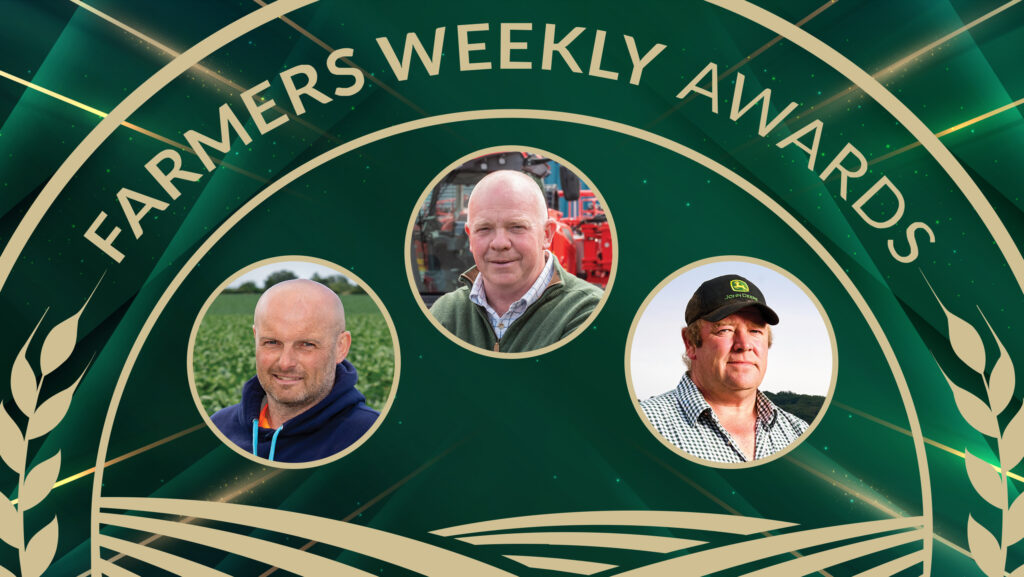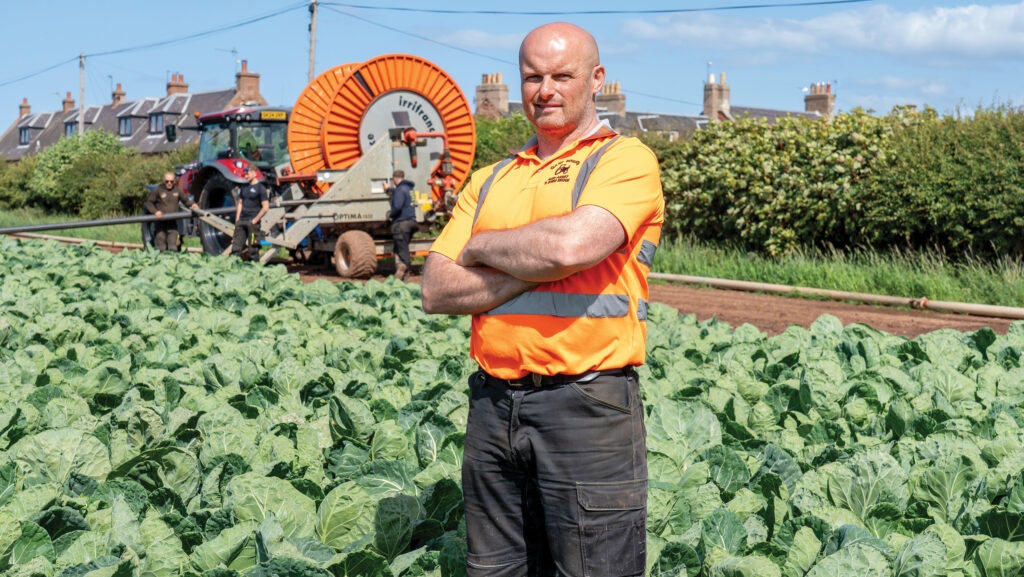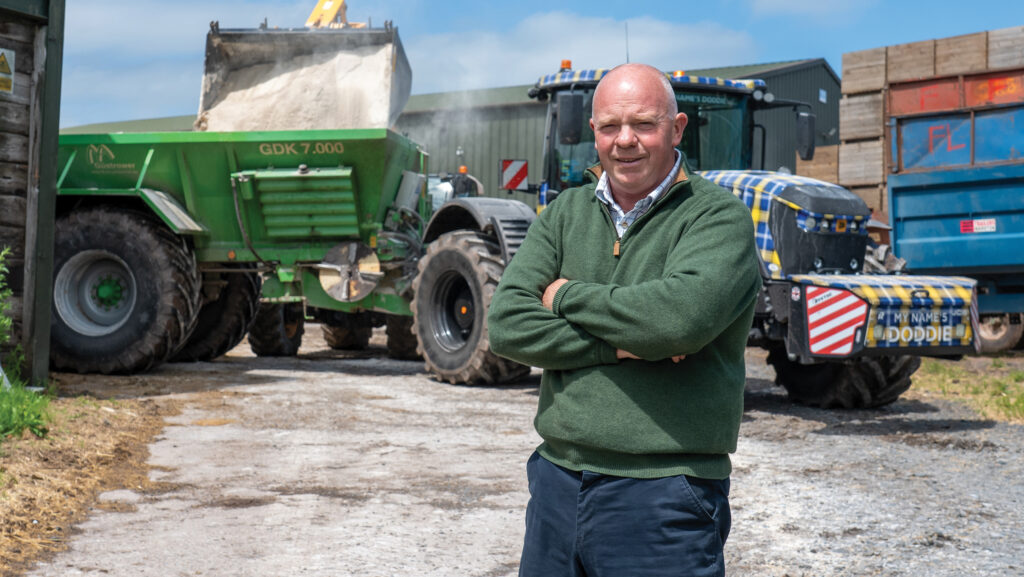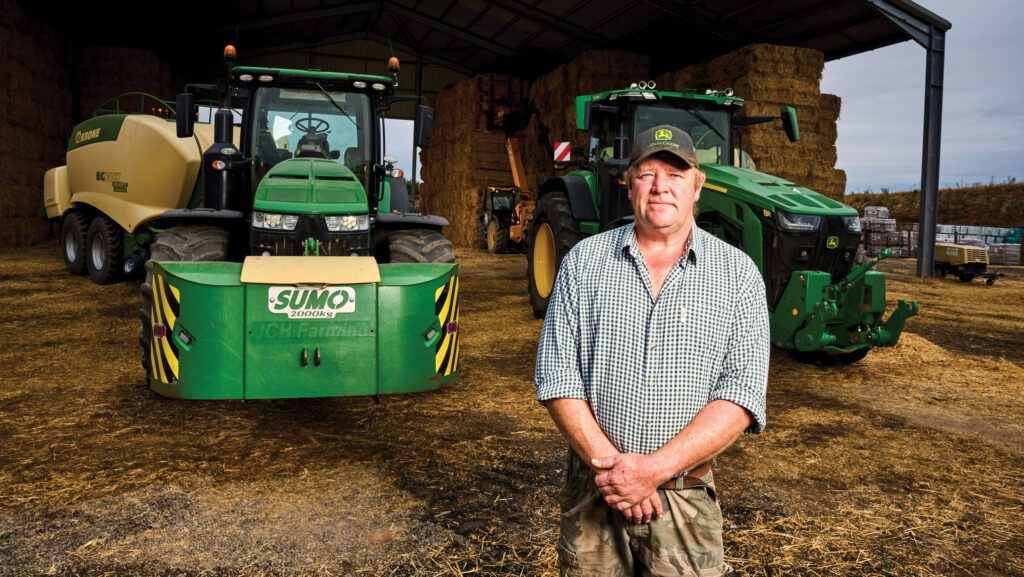FW Awards: Meet the 2025 Contractor of the Year finalists
 From left: Gary Hogarth Agri Assist, Crop Services' Douglas Stephen and Rookery Farms' Dan Willis © Angus Findlay/Oli Lees
From left: Gary Hogarth Agri Assist, Crop Services' Douglas Stephen and Rookery Farms' Dan Willis © Angus Findlay/Oli Lees Balancing growth with sustainable investments has been key to the success of these three very different firms in the running for this year’s Contractor of the Year Award.
Finalists
- Gary Hogarth Agri Assist, Wester Wooden Farm, Roxburghshire
- Crop Services, Roxburghshire
- Rookery Farms, Berkshire
The judges
- Jill Hewitt – Independent judge Jill is chief executive of the National Association of Agricultural Contractors.
- Nik Johnson – Nik’s Lincolnshire-based business, JSE Systems, bagged Farmers Weekly’s Contractor of the Year crown in 2024.
- Oliver Mark – Oliver is FW’s Machinery editor and has been on the Contractor of the Year judging panel for more than a decade.
See also: Farmers Weekly Awards 2024: Contractor of the Year
Gary Hogarth Agri Assist, Roxburghshire

Gary Hogarth © Angus Findlay
Gary Hogarth ditched barbells and treadmills to return to the agricultural industry, putting his physical and mental toughness to the test in building his contracting business from scratch.
After a decade as a fitness instructor, Gary decided to turn his hobby – spending his annual holidays harvesting on a nearby arable unit – into his full-time occupation.
It started following a stint on a combine seat in Australia in 2007. Not long after, he’d bought his first tractor – a 135hp Massey Ferguson 6290.
That man-and-machine service – which he supplied for harvesting and drilling through the summer months, and hedgecutting over the winter – has evolved into something far larger, supercharged by the Covid pandemic when farm businesses struggled to cope with the scarcity of machinery and labour.
Berwickshire-based veg producer Drysdales is one of several large outfits to lean heavily on his Agri Assist operation.
It now accounts for close to 70% of his workload; his tractors and staff helping plant leeks, sprouts and swedes, irrigate crops, then haul harvest trailers over the winter.
Further veg work comes from several other growers in East Lothian and the Scottish Borders, and he supplements this by hopping on a combine to cut 700ha for a local farming group.
His can-do attitude continues to open more business opportunities, helping to deliver near year-on-year growth in turnover and profit.
Machinery
Gary plays on the flexibility of his modestly sized outfit, tweaking his tractor fleet according to demand for his services.
It peaked at 10 machines during Covid – five Claas, five McCormick – but is currently settled at eight, neatly matching the availability of staff and work.
Six of those are now McCormicks, favoured for their reliability, performance, good dealer support and a watertight, excess-free five-year/5,000-hour warranty.
They keep his cost of ownership low, at about £8/hour, based on their average 1,000-1,500 annual hours.
And he intends to cut that further by hanging on to them for a year or two beyond the end of their finance period.
But it’s not all about supplying tractors and people. Gary hires out grain/silage and flatbed potato trailers, irrigation reels and pumps – kit that is long since paid for.
And he also now runs two diggers for farm tracks, drainage, caravan site foundations and water reservoir work, most of which is more lucrative than a tractor hourly rate.
Furthermore, he’s branched into reed bed dredging, a niche service for Scottish Water, for which he has a specialist stone cleaning digger attachment.
Staff and customers
A gradually broadening range of work is helping to keep his team of six busy year-round.
When they’re not on a tractor seat, they complete all machinery servicing in-house – aside from anything on the McCormicks that requires a dealer’s laptop.
Gary has his eye on expansion, not only with more profitable digger work but also silage, lime and fertiliser spreading, and combining – provided he can agree sustainable contracts that match his ambitions.
That will require expenditure, which is something he carefully manages.
To that end, he put up his prices by an average of 10% this year – and in some cases by 13% – to reflect rising costs.
Invoices are often sent, and timesheets processed, from the tractor cab on GPS-guided, slow-moving jobs or when irrigating.
The numbers
- 25 customers
- 17 years in business
- 6 near-full-time staff
Farm facts
- Primary services offered: Cultivations, hedgecutting, grain and silage carting, potato, swede, sprout, leek and carrot harvest support, machinery hire
- Main customer base: Arable, vegetable and livestock farms
- Area covered: Northumberland, Scottish Borders and East Lothian
The judges liked
- Agile business setup offers scope to alter machinery fleet according to needs
- Year-on-year improvements in turnover and profit
- Machinery hire helps maintain cashflow without reliance on staff
- Digger work and reed bed dredging provide further income steams
- Started from scratch in competitive sector
What the judges say
Gary’s flexible, pragmatic approach to machinery investments allows him to quickly adapt to market opportunities, and a series of shrewd diversifications helps keep the cash coming in during quieter months.
Crop Services, Roxburghshire

Douglas Stephen © Angus Findlay
From crude mounted sprayers to state-of-the-art, green-on-green systems, and from floppy discs to cloud storage, Scottish Borders-based Crop Services – and its customers – are reaping the rewards of a technology-focused approach that is transforming data into yields.
The family-run outfit remains the largest independent spraying contractor in its territory, which stretches from the Tyne to Angus and from the east coast across to Dumfries.
It is led by Douglas Stephen who has continued to build on the foundations of the Crop Chemicals business established by his father in 1962.
Headquartered in Kelso and backed up by a satellite site in Fife, it offers the full suite of contract spraying and spreading services, from crop protection products and fertiliser to lime and Fibrophos.
Also under the Crop Services umbrella are agronomy and engineering divisions – including a Sands sprayer service agency – as well as mobile seed dressing, pressure washer hire and grainstore cleaning, and Country Corner retail stores.
Machinery
Flexibility is key when it comes to contract spraying, and Crop Services is geared up with a range of machines for every eventuality.
There are demount spray packs on high-speed JCB Fastracs, lightweight McConnel Agribuggys and high-capacity Sands Infinitys.
For added application accuracy, there’s a Yara N-Sensor to determine real-time nitrogen, plant growth regulator and desiccant application requirements.
The most recent addition is Soil Essentials’ first 24m Skai spot sprayer, used to hit volunteer potatoes in broccoli and docks, nettles and thistles in grassland.
The fleet can cover every tramline width from 12m to 40m, and there’s enough reserve capacity to pick up any extra work and react rapidly to agronomist recommendations.
Douglas endeavours to buy British where possible, takes a horses-for-courses approach to machinery spec, and aims to keep the same operator on each machine.
This simplifies maintenance, aided by a Fleetio smartphone app for daily and weekly vehicle checks.
Any flagged issues are shared with managers and engineers, prioritised according to severity, and the resulting remedial work logged.
Expenditure is diligently recorded, with costs interrogated to ensure each vehicle is not kept beyond its economic lifespan.
Thanks to its new role as the main Sands service centre in Scotland and north-east England, the workshop and its three ag engineers are also tooled up to sort out-of-hours breakdowns.
Alongside this, Crop Services can complete customer sprayer services, MOTs, and maintenance and repairs, and is a National Sprayer Testing Scheme-approved testing centre for sprayers, spreaders and slug pelleters.
Staff and customers
Training and development are cornerstones of the business.
Staff turnover is low, with the longest-serving members of the 50-strong team having been in post for over 30 years.
The firm works with schools and colleges as part of a youth placement scheme. Most recently, this has included two local engineers and three agronomists.
It also hosts National Register of Sprayer Operators workshops, runs training sessions for Trimble PTx hardware and software, and offers customers support with integrated pest management plans, soil and carbon audits and other statutory paperwork.
Douglas helped launch a school countryside day, involving 1,250 primary pupils annually, and supports the motor neurone disease charity started by his friend, Doddie Weir, through the My Name’5 Doddie Foundation.
The numbers
- 430 customers across all divisions
- 63 years in business
- 52 full-time staff
Farm facts
- Primary services offered: Spraying and spreading, plus 360ha contract farming, mobile seed dressing, agronomy, chemical sales, machinery sales and service, and Country Corner retail outlets
- Main customer base: Arable, livestock and veg producers
- Area covered: Northumberland, Scottish Borders, Fife, Angus and Dumfriesshire
The judges liked
- Tech adds value to services, improves efficiency and saves customers money
- Machinery expenditure monitored to ensure economic viability
- Varied fleet allows all customers to be catered for
- Investment in staff development
- App to log machinery checks and report any issues
What the judges say
The adoption of technology has been the driving force behind Crop Services’ growth – adding value to its spraying and spreading division, and improving application efficiency to improve yields and profit margins.
Rookery Farms, Berkshire

Dan Willis © Oli Lees
The sight of a pristine fleet of John Deere prime movers prepped for action at Rookery Farms’ vast yard is Berkshire contractor Dan Willis’s reward for years of toil.
Having started his enterprise as an offshoot of the family’s 150ha farm, grain storage facility and feed supply business, he has gradually worked his way up the contracting food chain.
Work during those formative years involved paddock maintenance, muck heap removal and game cover sowing – a far cry from the Krone big balers, high-tech self-propelled sprayer and monster direct drill he now runs.
Much of the progress has stemmed from forging strong relationships with local landowners.
His seven key farm contracts have all but eliminated reliance on unpredictable last-minute “firefighting” work to give the business more structure and reliable, predictable income.
This has evolved through the introduction of sustainable farming systems, with Dan helping customers devise schemes that work for them and their land.
Though it has been to the slight detriment of his mainline arable work, he has grasped the opportunity to take an advisory role in their decision-making.
Latterly, that has included piloting a low-carbon approach to cereal production, tapping into attractive grain price premiums through the use of cover crops, variable-rate direct drilling and more accurately targeted herbicide applications.
Machinery
Combining, baling, cultivations and drilling account for the lion’s share of Rookery Farms’ work.
However, the team is also kept busy in the winter, loading 50,000t of straw destined for Wales via the nearby M4 motorway, and baling miscanthus in February and March, which helps keep some of the seasonal kit paying its way.
Dan is taking an increasingly pragmatic approach to machinery investments and divestments, evidenced by his recent decision to drop from two combines to one Deere S785i as schemes under the Sustainable Farming Incentive take hold in the area – albeit paired with a draper header that has increased output by 10-15%.
He has also hardened his approach to tractor replacements.
Until 2021, the JD 7Rs and 8Rs were changed every two or three years with 2,500 hours on the clock, but more caution is now applied to ensure the business isn’t engulfed by surging costs – some of the front-liners are bought second-hand and all are run for longer.
Crucially, they’re still protected by warranty, which allows for better financial forecasting to manage risks.
Staff and customers
Dan often takes the graveyard shift on the sprayer at 3am.
Between times, he troubles himself to train “green” staff, a challenging but rewarding process that has seen two apprentices from Sparsholt College become fully-fledged members of the team.
Provided they’ve got the right attitude, he’ll even take on staff from non-farming backgrounds.
This benevolence has seen many go on to forge good careers in agriculture, including managing local farms.
Training includes a pre-harvest health and safety away day, covering everything from ratchet straps to combines and overhead power lines.
The five full-time and six harvest staff are given structured rest and, when they’re ready, responsibility to make their own decisions – not least foreman Billy, who has risen through the Rookery ranks over the past seven years.
He is now involved in most key conversations, negotiations and decisions, taking some of the pressure off Dan.
The numbers
- 40 customers
- 20 years in business
- 5 full-time staff
Farm facts
- Primary services offered: Cultivation and drilling, combining, baling, spraying, mowing, muckspreading, trailer hire
- Main customer base: Arable and livestock farms
- Area covered: Up to 13 miles from Curridge base
The judges liked
- Dedication to training new entrants
- Advisory role keeps Rookery Farms at the heart of customers’ businesses
- Willingness to scale down services according to customer demand
- Pristine and high-tech machinery fleet
- Leading the way on low-carbon cereals to improve crop profitability
What the judges say
Dan’s unabating enthusiasm paired with a considered attitude to expansion has ensured his enterprise grows organically, with added-value advisory services putting him at the heart of customers’ businesses.
A word from our sponsor

“I was hugely impressed when spending time with the three finalists; evolving business models and high levels of customer service are setting new standards of excellence across our industry.”
Matthew Smart, founder and director, Rural Asset Finance

